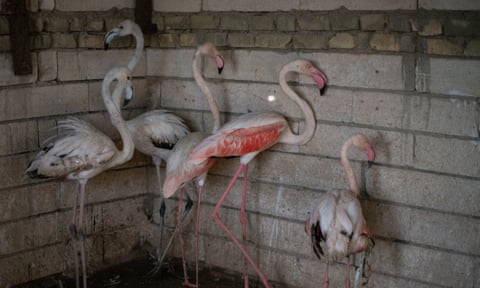“Is it flamingos you’re looking for? Come to my place after 1pm,” whispers Mustafa Ahmed Ali from inside his small shop, which is buzzing with bird sounds of all kinds. He has been selling birds – wild and bred – at the bird market in Amara, in Iraq’s Maysan province, for more than 30 years.
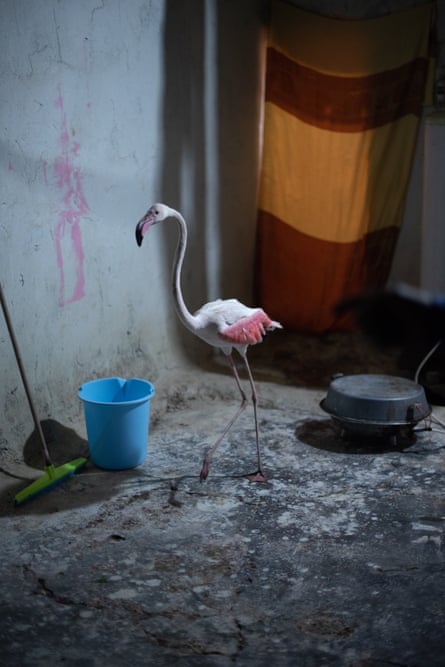
A pet flamingo that lives on Ali Abou Hussein’s farm outside Amara
Bird poaching can be a lucrative business in Maysan, which is located between the Ahwar marshes – a Unesco world heritage site – and the border with Iran, putting it at the forefront of bird trafficking. The region is a poor one and the illegal trafficking of birds is a lifeline for many families.
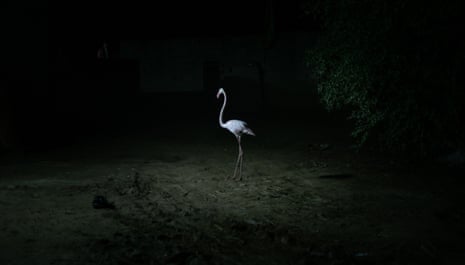
Hussein says the flamingos he keeps are free to wander the farm and that they have never flown off
In his small bricked house in Amara’s suburbs, Ali admits selling various species of birds, mostly to rich Iraqis or foreigners from the Gulf states. “They travel all the way here from countries such as Kuwait, Saudi Arabia or even Qatar,” he says.
On his rooftop, he opens the gate of a large cage full of chattering flamingos. “People want them to decorate their gardens, or to put them in their private zoos. I’m the one supplying many Iraqi buyers.
“Many flamingos die in my cage, especially during warm summer days,” he admits, adding: “I sell between one and 10 of those birds every month during winter, the peak season. They buy them dead or alive, because people also eat them.”
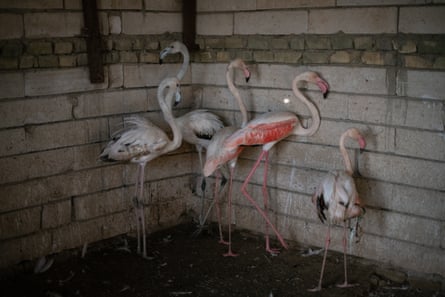
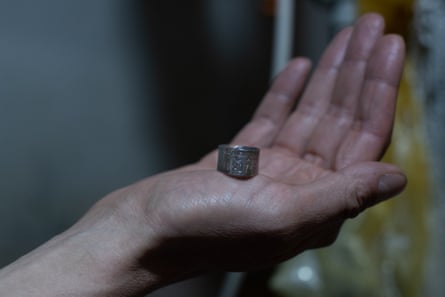
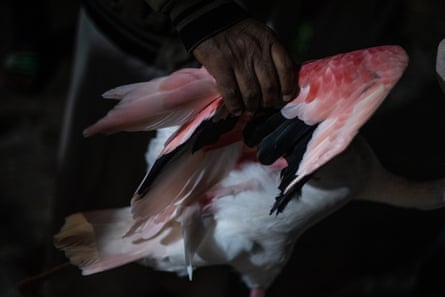
Flamingos belonging to Mustafa Ahmed Ali. He sells up to 10 birds a month. A ring found on one of Hussein’s birds, which he is seen clutching, shows it came from Iran
It is during the winter months of October to February that the birds migrate towards the southern Iraqi marshes, where temperatures are milder and there is an abundance of food. Those that are captured are sold for 30–40,000 Iraqi dinars (£15–£20).
Holding a flamingo tightly under his arm, Ali says the police are no threat to his business, despite a local decree banning flamingo poaching. Nonetheless, he remains cautious, adding: “I don’t bring flamingos into my shop. No need … people know where to find me, and if they do want one, they meet me at home or I can deliver the bird directly to their place.”
Ahmed Saleh and Ali Abou Hussein show off their flamingos
According to Samir Aboud, the head of Maysan’s environment department, there is no specific legislation protecting flamingos. However, several international agreements, ratified by Iraq, protect migrating birds and forbid poaching in the marshes. But their mandate remains limited. Aboud says: “Since the poaching areas are at the border between Iran and Iraq, it falls under the jurisdiction of the border protection forces, making it difficult for our police department to control the area or conduct arrest operations.”
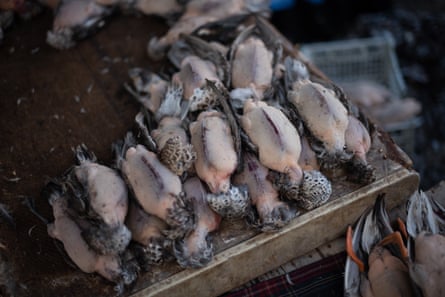


The bird market in Amara where flamingos are often sold dead for meat
There is, however, a provincial government ban on the sale of flamingos in markets. The decree was initiated following a civil society campaign, led by Ahmed Saleh, known as Dr Hamoudi, a well-known environmental activist from Amara. Despite the precarious living conditions in the province, many people in Maysan are sensitive to ecological issues. As a result, sellers are forced to be more discreet than before.
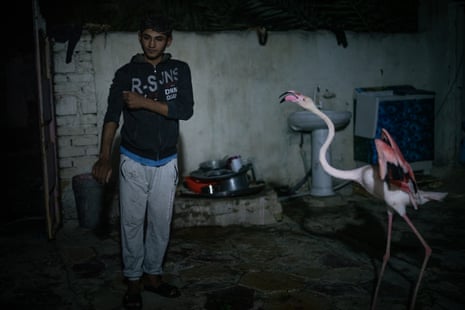
Ali Abou Hussein’s son plays with one of their three flamingos in a courtyard of their house
Another man called Ahmed Saleh, no relation to Dr Hamoudi, recently bought some flamingos for his garden. His kitschy fountain is lit with pink, blue and red iridescent lamps, shading the wild birds with a wide variety of colours. His brother offered the birds to him two days earlier. “When he brought them, they were in bad condition, they couldn’t even stand up. But when they saw the fountain, they got better and started moving around. I’ve been looking for flamingos for a while now, mainly because it’s a beautiful bird to have in a garden,” Saleh says.
The flamingos are unable to escape Saleh’s garden because they lack the necessary space to take off. Sometimes, the poachers or owners cut off the main feathers of the birds to prevent them from flying away.
Ali Abou Hussein bought three flamingos seven years ago. “Their feathers were never taken off, yet they never left. I think they have turned into a kind of domesticated pet,” he says, adding that the birds are allowed to move freely on his farm on the outskirts of Amara.
Ali, the bird seller, buys his flamingos from poachers in Sheeb, a large swamp area close to the Iranian border. He refused to drive us there. “Strangers are not allowed to go into the poacher’s territory,” says Ali.
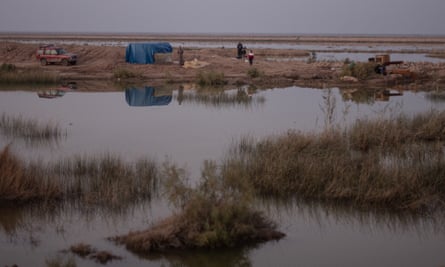
Poachers in the marshes near Amara, about 35km from the Iranian border
Dr Hamoudi knows this area well. “Each year, thousands of birds are captured in the marshes. I know the hunting grounds well, so I sometimes give information to the environmental police in order to help them in their operations. They’d be unable to conduct them otherwise,” he says. He also regularly buys wild animals on the black market only to release them afterwards. “So far, I’ve freed 17 flamingos and many other animals from poachers.”
Dr Hamoudi is regularly threatened by the poachers. He says: “They’re armed and when they notice me monitoring their moves, they threaten me and urge me to never come back or I’ll get killed.”

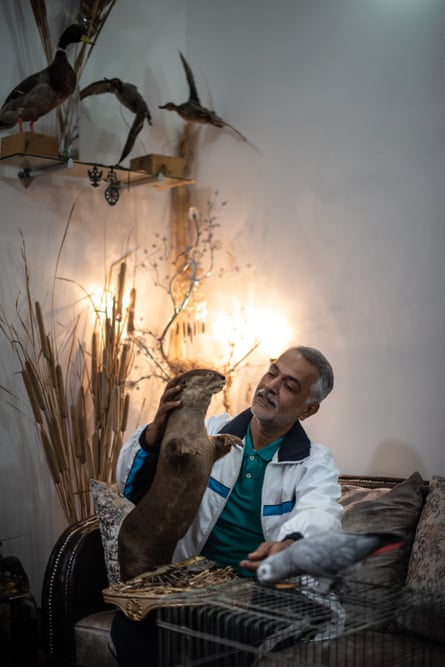
Ahmed Saleh’s recently bought flamingos in his garden (left), and ‘Dr Hamoudi’, who shares Ahmed Saleh’s name but works to save the flamingos and release them back into the wild
While trying to reach Sheeb, we encountered four armed poachers. One was carrying an axe while another nervously waved his gun at us, ordering us to leave immediately.
The Iraqi marshes were known for being the stronghold of the resistance against Saddam Hussein’s regime, confronting his army in the early 1990s, during what was known as the Battle of the Marshes. These swamps at the Iranian border have remained a lawless place since then, where flamingo poaching, like drug and weapon smuggling, is a business like any other.

One of Ahmed Saleh’s flamingos
